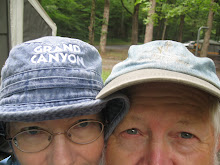Yesterday on her blog “Stopping by Woods,” sweffling discussed her efforts to find a tutor or tutors for her
grandson, a gifted youngster who had become bored with school.
Her search was based
on her recognition, from personal experience as a freshman undergraduate, that children
and adults can understand concepts behind scientific research, even without
extensive training in the sciences.
Such understanding often
depends on the scientist’s ability and willingness to verbally boil their research
down to basic concepts.
A number of the researchers I worked with through my years as a public information officer were natural communicators. Many more had totally different ideas of what constituted “basic” than what was actually effective.
A number of the researchers I worked with through my years as a public information officer were natural communicators. Many more had totally different ideas of what constituted “basic” than what was actually effective.
That’s why I enjoyed
observing the wake-up moment a group of scientists and university research
vice presidents experienced at a marine education center and aquarium that focused
on plants, animals and processes of Mississippi coastal waters.
The scientists and
administrators were assembled to evaluate proposals
for grant awards. On a tour of the center the group paused in the
background as a volunteer led a dozen pre-schoolers to one of the tanks that featured living oysters.
She explained in
simple terms about the process the oysters go through to cleanse themselves of
pollutants when they are moved from polluted to clean waters. One of the
research vice presidents turned to me in amazement.
"She's teaching
them about oyster depuration!" he said.
And so she was. The children’s
responses to the volunteer’s questions, their queries for her and their excitement
made it evident that they understood the scientific concepts she presented in
language that was scientifically accurate and appropriate for their age.
Oh, and the education center's proposal was approved.

the word science has me yawning, but i could learn like she taught with the oysters....
ReplyDeleteMy grandson would have loved that lecture.
ReplyDeleteAnd did your friend find a tutor? Perhaps there's a museum of any sort near her of any sort that offers lectures or classes.
ReplyDeleteExperts don’t know it all, do they?
ReplyDeleteCommunication is a great skill. I am amazed with what kids can understand if only we can communicate with them. I have difficulty reaching children at times, however my daughter works with autistic kids and she has the gift. It is a gift. Diianne
ReplyDeleteI always believed and understood this to be true. It affected attitude toward my colleagues who taught so effectively in the elementary school and the disdain I felt toward the snobs higher up the hierarchy who had no understanding of it at all.... btw I taught at elementary, high school and college....
ReplyDeleteBravo to those that held the purse strings. I am glad that they could see the value of the Ed centers work.
ReplyDeleteI'm so grateful for those that can teach on the right level and engage those they are teaching.